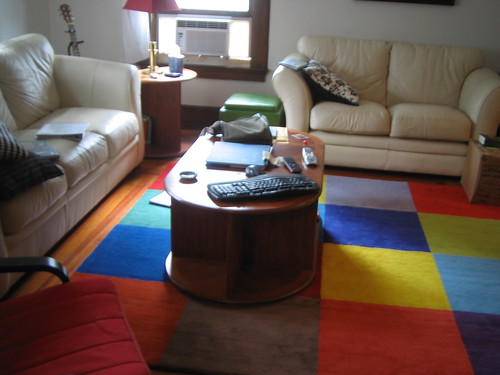26th Sunday in Ordinary Time (C)
My dear friends, do you know the difference between furniture and clutter? Imagine for a moment, if you will, your dream home. What does the interior look like? What do you find there? … Now imagine what the home of a hoarder probably looks like. Someone who compulsively collects junk. What’s the difference between the two? One obvious difference would be, of course, the amount of stuff in each house. Very likely, there’s much more stuff in the hoarder’s house than in your dream home.
But that’s not the only difference, right? Isn’t it true that even some well-furnished homes can be quite full of stuff as well? It’s just that the stuff is arranged in such a way that it somehow doesn’t make the space feel crammed. On the contrary, it actually makes it cosier. More inviting. Isn’t this the key difference between furniture and clutter? A properly furnished home welcomes people in. But a house that’s filled with clutter simply crowds them out.
Furniture welcomes in. Clutter crowds out.
This is true not just of our homes, but also of our lives as well. Like homes, human lives too can be filled with either furniture or clutter. They can either be welcoming, or they can crowd people out. Isn’t this what we find in our Mass readings for today? Both the first reading and the gospel speak to us of people whose lives are filled with clutter.
The first reading is a dire warning addressed to those living in the lap of luxury. They lie on ivory beds. Feast on lamb and veal. Enjoy wine and song. But, attractive though it may be, all this luxury is actually no more than clutter. It fills the hearts and lives of the rich in such a way as to leave no room for the poor. This is the serious accusation that is levelled against them. The grievous sin from which the rich need to repent: About the ruin of Joseph they do not care at all. And this kind of cluttered living has serious consequences for the rich themselves. When attacked by their enemies, they will be the first to be exiled.
Cluttered lives, which crowd out the poor, leading to dire consequences. Clutter. Crowding. Consequences. We find the same 3-fold pattern in the life of the rich man in the gospel parable. Not only does he dress in designer clothes, and feast on gourmet meals. But he does this every day. And all this decadence causes him to fail to notice the destitute person lying at his gate. As a result, after he dies, the rich man suffers in Hades. A cluttered life, which crowds out the poor, leading to dire consequences. The same sad pattern as in the first reading.
Except for one additional detail. Something very important. Something highlighted by the opening words of the gospel. Words that tell us to whom the parable is addressed. Jesus said to the Pharisees… To better appreciate the importance of these words, we need to recall what earlier verses of the gospel tell us about the Pharisees. Not only do they love money, they also present themselves as highly religious people (cf. Lk 16:14-15). But the kind of religion they practise serves only to harden their hearts. Causing them to ignore the suffering of others. In other words, luxury is not the only thing that can clutter up our lives. Certain forms of religion do too. The kind of religion that tends to make us arrogant instead of humble. Self-righteous rather than merciful. Judgmental instead of forgiving.
But if this is what clutter looks like in the spiritual life, then what about furniture? We find the answer in the advice that St. Paul gives Timothy in the second reading. As a man dedicated to God, you must aim to be saintly and religious, filled with faith and love, patient and gentle… The kind of religion that Paul and Timothy practice fills their lives, not with the clutter of luxury and self-righteousness, but instead with the furniture of God’s loving and merciful presence.
And this divine presence causes them to act in a particular way. The same way in which God acts. The way described in the responsorial psalm. Which tells us that God is just to the oppressed, gives bread to the hungry, sets prisoners free, gives sight to the blind, raises up those who are bowed down… This is what it means to live a saintly and religious life. To be filled with the furniture of God’s presence. It is, quite simply, to welcome those most in need. Those who are poor. Not just materially. But spiritually as well.
As it is with our homes, so too in the spiritual life. Furniture welcomes people in. And clutter crowds them out. All of which might help us to reflect more deeply on ourselves. Very likely, for many of us, our lives are filled with a lot of stuff. Many activities and things. Many people and relationships. Which isn’t a bad thing. But the important question to ask is how we relate to all this stuff. How we arrange them in our lives. And, especially, what is at the centre of everything.
If what fills the centre is nothing more than our ego, our own selfish concerns and anxious strivings, then our lives will be cluttered. Crowding out all concern for others. Especially the needy. If, on the other hand, we allow God to occupy the centre of our lives, then we will gradually become more and more open to others. Even those who may be different from ourselves.
Welcoming in or crowding out. Hospitality or indifference. This is what distinguishes the godly from the selfish. And not just godly and selfish individuals. But also godly and selfish countries, communities, parishes, neighbourhood groups, ministries, families…
Furniture welcomes in. Clutter crowds out.
My dear sisters and brothers, with which of these are we filling our hearts and our lives today?



